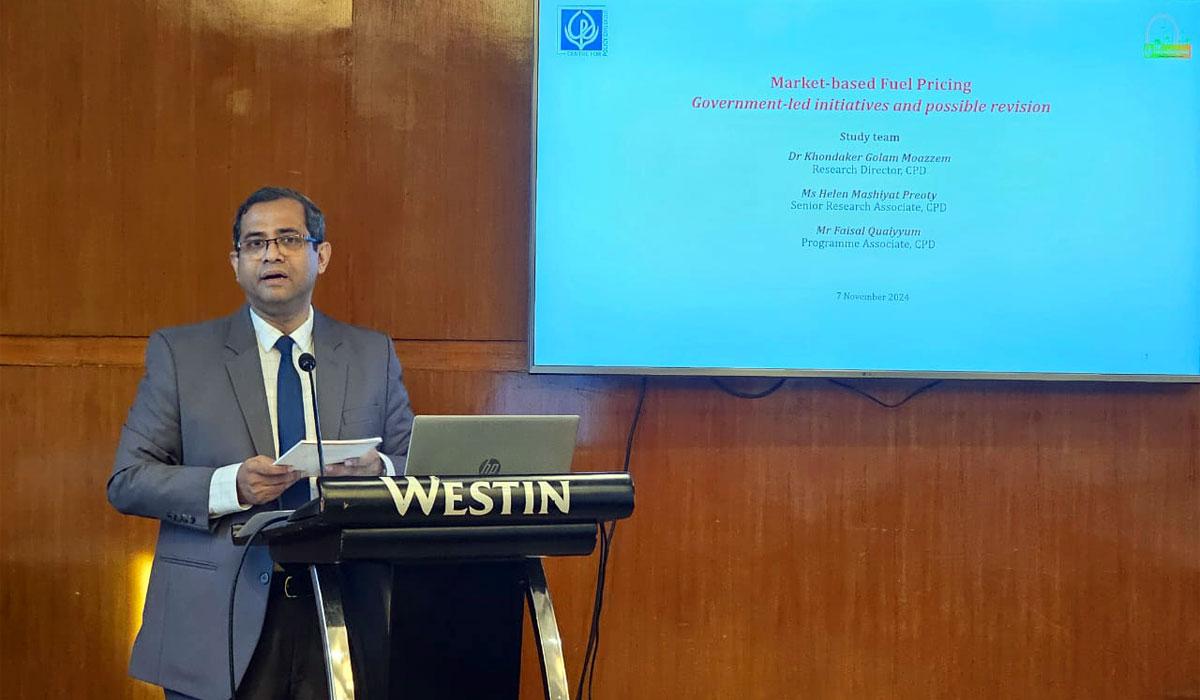
In March 2024, Bangladesh adopted a market-based pricing system for various fuel oils, including diesel, petrol, octane, kerosene, and jet fuel. This shift aligns with the government’s objective of reducing fiscal burdens linked to subsidies and meeting conditions set by the International Monetary Fund (IMF). The transition from a heavily subsidised, regulated system to a dynamic, market-oriented pricing model represents a crucial economic shift with far-reaching impacts on consumers, businesses, and the national economy.
In light of this, the Centre for Policy Dialogue (CPD), in partnership with the Australian High Commission in Dhaka, has conducted a comprehensive study to analyse potential outcomes, challenges, and areas for revision to support this model. To discuss these issues, a debriefing session was organised on Thursday, 7 November, 2024.

The newly introduced pricing model by the Bangladesh Petroleum Corporation (BPC) aims to alleviate government fiscal strain by gradually phasing out fuel subsidies, while ensuring that price adjustments do not disproportionately impact vulnerable communities. It also aspires to aid Bangladesh’s commitment to sustainable energy transitions. However, this new system requires careful oversight to balance market demands with socio-economic needs. CPD’s study examines various international practices and presents a conceptual framework for an optimal pricing strategy in Bangladesh, with the goal of ensuring fairer prices and enhancing economic stability.
Subsidies in Bangladesh’s energy sector have heavily burdened the national budget. In recent years, energy subsidies have escalated sharply, reaching Tk. 23,000 crore in FY2023, with projections of Tk. 40,000 crore by FY2025. While these subsidies have aimed to provide affordable energy access, they present challenges in the current economic climate, especially given global energy price volatility.
In examining international models, CPD’s study found that neural network-based models offer distinct advantages for capturing non-linear, complex interactions typical of volatile energy markets. Traditional models, such as time-series or mean-reversion models, often prove inadequate in dynamic environments. A neural network model could provide Bangladesh with a more robust and adaptable framework that integrates international benchmarks with local economic factors.
The transition to BPC’s automatic pricing model, implemented in early 2024, has brought certain challenges to light. One notable issue is the high margins and charges, including a 9% financing charge per litre, which adds a financial burden on consumers. Inconsistent exchange rates are another concern, as the method used in determining these rates has faced criticism for lacking transparency. Additionally, multi-layered tax structures significantly contribute to higher consumer prices, sparking calls for a streamlined approach through the Bangladesh Energy Regulatory Commission (BERC).
To address these issues, CPD advocates a refined model that uses neural network algorithms to determine import prices while integrating factors such as global crude oil production, international inflation rates, and shifts in supply and demand dynamics. Incorporating local economic indicators, including domestic inflation rates, GDP growth, and fuel consumption trends, would allow this model to better reflect Bangladesh’s unique economic context. Furthermore, the model would dynamically recalibrate based on emerging data to ensure ongoing relevance and accuracy in fuel pricing.
Empowering BERC as the regulatory authority for all fuel pricing decisions is critical to ensuring transparency and enabling regular public reviews. Shifting to a predictive pricing model, as advocated in CPD’s proposed approach, would allow consumers and businesses to better anticipate and manage costs, thus reducing their vulnerability to abrupt price changes. Simplifying the tax structure would alleviate the compounding effects of multiple tax layers, providing some relief to consumers. Moreover, the predictive model could support long-term planning for a shift towards cleaner energy sources, aligning with Bangladesh’s broader sustainability objectives.
Bangladesh’s move to market-based fuel pricing represents a significant economic transition with potential benefits in terms of fiscal responsibility and alignment with global energy standards. While challenges remain, particularly around transparency and regulatory control, CPD’s study offers a well-considered framework for guiding policy enhancements that prioritise both consumer affordability and national economic stability. A successful transition will require regular adjustments and open dialogue among stakeholders to ensure that the pricing model is reflective of both global trends and local realities.



